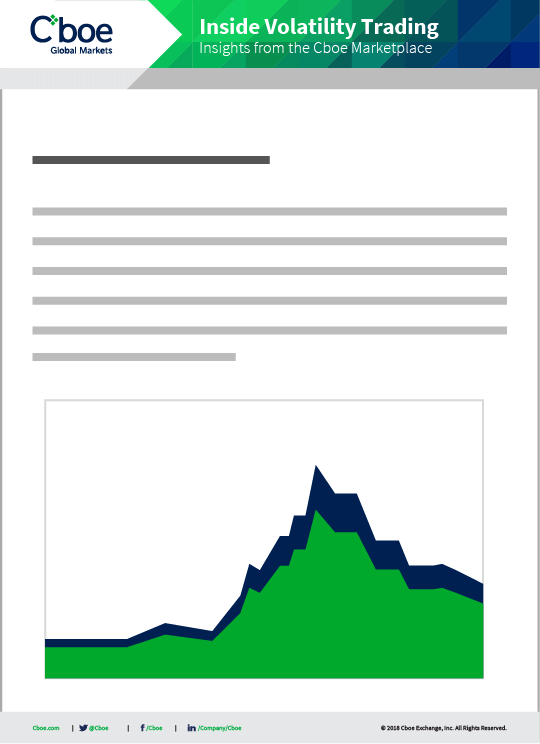Trading futures can open the door to opportunities in new markets.
Futures contracts, like options, are derivatives. But in some ways, futures are easier to understand and price than options. Futures prices are derived directly from the spot or cash price of the contract’s underlying asset, so futures prices generally move in tandem with the underlying, unlike options. And since futures contracts require market particpants to buy or sell an asset in the future, as compared to giving them an option to buy or sell, futures contracts can't be exercised early. A futures contract can be on an index, a stock, commodity, currency, interest rates, or even volatility.
Futures offer a number of key advantages over stocks and options, but they also typically employ greater leverage, which can be both a benefit and a risk.
5 Reasons to Trade Futures
-
Futures traders generally can access markets in a broad range of asset classes, which makes it possible to diversify a portfolio beyond the traditional "stocks/bonds/cash" allocation model.
-
Futures trading involves leverage, which can empower traders to take a larger position with a smaller upfront outlay of capital.
-
Futures traders may be able to report their overall profit and loss when they file taxes instead of listing each transaction. And like index options, gains may be eligible for 60% long-term, 40% short-term capital gains treatment.*
-
Futures traders generally are better positioned to sell short than stock traders. That’s because futures traders don’t need to borrow shares from their broker or get margin privileges.
-
Futures market participants may be able to trade market-moving events when they occur because many futures trade nearly 24 hours per day, five days per week.
Cboe Mini VIX Futures

At 1/10th the size of the standard VIX futures contract, Mini VIX futures allow market participants to trade or hedge equity market volatility or execute volatility strategies with a smaller notional size contract.
Mini VIX futures are complicated financial products that are suitable only for sophisticated market participants. Before trading Mini-VIX futures it is important to understand the complexity and associated risks, which are fully described at www.cboe.com/minivix. Please read carefully before investing
Futures, Stock Options, and Stocks
| Futures | Stock Options | Stocks | |
|---|---|---|---|
| Diversification | Gain exposure to a wide variety of assets, such as stock indices,commodities, bonds, currencies, and volatility. | Trade options on individual companies in different sectors. | Partial ownership of companies. |
| Margin | Initial margin requirements are usually a fraction of the contract value. While they don't change frequently, there are also maintenance margin levels that must be adhered to (i.e., in the event of a particular loss in contract value). | Margin requirements can be complicated. Typically long option strategies require no additional margin, whereas others fall under different levels. | 50% of the purchase amount (Regulation T). |
| Trading Hours | Often trade nearly 24 hours a day, five days a week. | Trade from 9:30 a.m. to 4:00 p.m. ET. | Trade from 9:30 a.m. to 4:00 p.m. ET. |
| Exercise and Settlement | Settle to the underlying asset or cash. Contracts are marked-to-market daily and profits/losses reflected in account cash balances. | Settle to the underlying stock; American style. | Settlement takes place T+2 days after order execution. |
| Tax Treatment | May be eligible for 60% long term, 40% short-term capital gains tax treatment.* | Standard capital gains tax treatment. | Standard capital gains tax treatment. |
Qualifying to Trade Futures
You don't necessarily need a special account to buy stocks, but to trade futures you need to apply for a separate futures account. There's inherent leverage when trading futures—you only put up a fraction of a contract’s value—and this can affect both trader and broker. Different brokerages have different qualification criteria, such as account minimums, margin requirements, and risk limits. Always be an educated trader and know the qualification criteria as well as the market you’re trading.
Always be an educated trader and know the qualification criteria as well as the market you're trading.
Volatility 411 Daily Video
*Under section 1256 of the Tax Code, profit and loss on transactions in certain exchange-traded options and futures are entitled to be taxed at a rate equal to 60% long-term and 40% short-term capital gain or loss, provided that the investor involved and the strategy employed satisfy the criteria of the Tax Code. Investors should consult with their tax advisors to determine how the profit and loss on any particular option or futures strategy will be taxed and should be reported for tax purposes. Tax laws and regulations change from time to time and may be subject to varying interpretations. No representation is made regarding tax consequences or tax reporting requirements.
Futures trading is not suitable for all investors, and involves the risk of loss. The risk of loss in futures can be substantial and can exceed the amount of money deposited for a futures position. You should, therefore, carefully consider whether futures trading is suitable for you in light of your circumstances and financial resources. For additional information regarding futures trading risks, see the Risk Disclosure Statement set forth in the Risk Disclosure Statement set forth in Appendix A to CFTC Regulation 1.55(c) and the Risk Disclosure Statement for Security Futures Contracts.
It is important for market participants to understand the following before trading Mini VIX futures on Cboe Futures Exchange: Mini VIX futures are complicated financial products that are suitable only for sophisticated market participants. Mini VIX futures involve the risk of loss, which can be substantial and can exceed the amount of money deposited for the futures position. Market participants should put at risk only funds that they can afford to lose without affecting their lifestyles. Before transacting in Mini VIX futures, market participants should fully inform themselves about the characteristics and risks of Mini VIX futures, including in particular those described at www.Cboe.com/MiniVIX. Mini VIX futures market participants also should make sure they understand the product specifications and the methodologies for calculating the underlying VIX Index and the settlement values for Mini VIX futures.
Past performance is not indicative of future results. The information in this article is provided for general education and information purposes only. No statement(s) within this article should be construed as a recommendation to buy or sell a security or future or to provide investment advice. Supporting documentation for any claims, comparisons, statistics or other technical data in this article is available by contacting Cboe Global Markets at cboe.com/contact.
